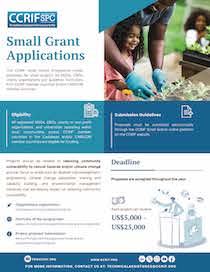A magnitude 5.0 earthquake occurred at 08:47:40 UTC on 10 February 2021, 38.8 km (24.1 mi) SSW off Jucuarán, El Salvador; 39.8 km (24.7 mi) SSE off Puerto El Triunfo, El Salvador and 144.5 km (89.8 mi) WNW off Chinandega, Nicaragua. Estimates from the United States Geological Survey (USGS) located the epicentre of the event at 12.949°N, 88.420°W, and at a depth of 91.6 km (56.9 mi). Nicaragua was the only CCRIF member country that was affected by the earthquake.
A magnitude 5.0 earthquake occurred at 07:05:02 UTC on 6 February 2021, 84.5 km (52.5 mi) SSE off Road Town, British Virgin Islands; 91.4 km (56.8 mi) N off Charlotte Amalie, Saint Thomas Island, U.S. Virgin Islands and 127.7 km (79.3 mi) NE off Fajardo, Puerto Rico. Estimates from the United States Geological Survey (USGS) located the epicentre of the event at 19.156°N, 64.816°W, and at a depth of 78.0 km (48.5 mi). The British Virgin Islands was the only CCRIF member country that was affected by the earthquake.
A magnitude 5.0 earthquake occurred at 05:35:28 UTC on 30 January 2021, 53.1 km (33 mi) S of Intipucá, El Salvador; 84.1 km (52.2 mi) SSE of Usulután, El Salvador and 97.7 km (60.7 mi) WNW of Chinandega, Nicaragua. Estimates from the United States Geological Survey (USGS) located the epicentre of the event at 12.721°N, 88.021°W, and at a depth of 68.5 km (42.6 mi). Nicaragua was the only CCRIF member country that was affected by the earthquake.
A magnitude 5.0 earthquake occurred at 05:35:28 UTC on 30 January 2021, 53.1 km (33 mi) S of Intipucá, El Salvador; 84.1 km (52.2 mi) SSE of Usulután, El Salvador and 97.7 km (60.7 mi) WNW of Chinandega, Nicaragua. Initial estimates from the United States Geological Survey (USGS) located the epicentre of the event at 12.721°N, 88.021°W, and at a depth of 68.5 km (42.6 mi). Nicaragua was the only CCRIF member country that was affected by the earthquake.
A magnitude 5.4 earthquake occurred at 23:21:41 UTC on 24 January 2021, 62.5 km (38.8 mi) ESE of Road Town, British Virgin Islands; 92.3 km (57.4 mi) NE of Saint Croix, U.S. Virgin Islands and 167.3 km (104 mi) E of Fajardo, Puerto Rico. Initial estimates from the United States Geological Survey (USGS) located the epicentre of the event at 18.252°N, 64.071°W, and at a depth of 94.0 km (58.4 mi). The British Virgin Islands was the only CCRIF member country that was affected by the earthquake.
Tropical Cyclone Iota was the thirty-first and most powerful tropical cyclone of the 2020 Atlantic Hurricane Season, overtaking in intensity the recent Hurricane Eta. Iota developed from a powerful tropical wave moving across the eastern Caribbean Sea, which evolved into a tropical depression on 13 November. Six hours later, it strengthened into a tropical storm while it was over the central Caribbean Sea, north of Colombia. In the following days Tropical Storm Iota intensified, becoming a major hurricane on 16 November.
On 2 November, Tropical Storm Eta rapidly intensified, becoming a major hurricane, and on 3 November it made landfall in Nicaragua as a category 4 Hurricane. Hurricane-force winds and catastrophic storm surge were experienced near the landfall point. While moving across Nicaragua, Eta rapidly lost intensity, being downgraded to a tropical storm on 4 November and to a tropical depression on 5 November, when it left the country heading for Honduras. During this period, tropical-storm-force winds extended over a large part of Nicaragua.
Tropical Cyclone Eta was the twenty-ninth and at the time the most powerful tropical cyclone of the 2020 Atlantic Hurricane Season.
The Bahamas North West was the only area within The Bahamas that was affected by wind speeds greater than 39 mph (62.7 km/h).
Tropical Cyclone Eta was the twenty-ninth and most powerful tropical cyclone of the 2020 Atlantic Hurricane Season. Eta developed from a powerful tropical wave moving across the eastern Caribbean Sea, which evolved into a tropical depression on 31 October. On 1 November, it strengthened into a tropical storm while it was over the central Caribbean Sea. On 2 November, Tropical Storm Eta rapidly intensified, becoming a major hurricane, and on 3 November it made landfall in Nicaragua as a category 4 hurricane.
Saint Lucia was under the influence of two tropical waves resulting in adverse weather conditions that occurred primarily between October 28 and November 1, 2020. During this period, Saint Lucia was affected by periods of rainfall and thunderstorm activity.
This event briefing describes the impact of rainfall on Saint Lucia, which was associated with a Covered Area Rainfall Event (CARE), starting on 29 October and ending on 3 November 2020.





